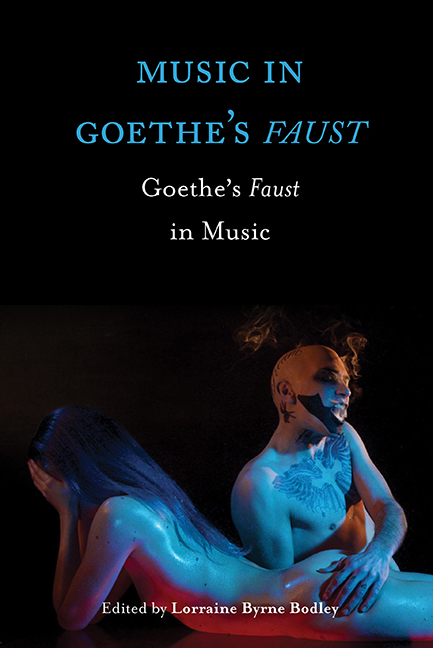Book contents
- Frontmatter
- Dedication
- Contents
- List of Illustrations
- Contributors
- Acknowledgements
- Abbreviations Used in the Notes
- Introduction. Rhapsody and Rebuke: Goethe's Faust in Music
- Part I Goethe's Faust: Content and Context
- Part II Legacies: Goethe's Faust in the Nineteenth Century
- Part III Topographies: Stagings and Critical Reception
- 12 Operatic Translation and Adaptation: Gounod's Faust, with a Tribute to Ken Russell
- 13 ‘Adapters, Falsifiers and Profiteers’: Staging La Damnation de Faust in Monte Carlo and Paris, 1893–1903
- 14 Faust in the Trenches: Busoni's Doktor Faust
- Part IV New Directions: Recent Productions and Appropriations
- Select Bibliography
- Index
12 - Operatic Translation and Adaptation: Gounod's Faust, with a Tribute to Ken Russell
from Part III - Topographies: Stagings and Critical Reception
Published online by Cambridge University Press: 30 August 2017
- Frontmatter
- Dedication
- Contents
- List of Illustrations
- Contributors
- Acknowledgements
- Abbreviations Used in the Notes
- Introduction. Rhapsody and Rebuke: Goethe's Faust in Music
- Part I Goethe's Faust: Content and Context
- Part II Legacies: Goethe's Faust in the Nineteenth Century
- Part III Topographies: Stagings and Critical Reception
- 12 Operatic Translation and Adaptation: Gounod's Faust, with a Tribute to Ken Russell
- 13 ‘Adapters, Falsifiers and Profiteers’: Staging La Damnation de Faust in Monte Carlo and Paris, 1893–1903
- 14 Faust in the Trenches: Busoni's Doktor Faust
- Part IV New Directions: Recent Productions and Appropriations
- Select Bibliography
- Index
Summary
One of the many hats donned by Goethe's Faust is that of Biblical translator and exegete. After his repudiation of scholarly learning, the chorus's strains of the ‘süßen Himmelslieder’ [sweet heavenly voices] halt his suicide attempt and reawaken his childhood Christian faith. Irritated by the growling poodle after his Easter walk, he turns to the opening verses of St John's Gospel in the first ‘Studierzimmer’ [study] scene and attempts to translate the ‘sacred original’ into German:
Mich drängt's, den Grundtext aufzuschlagen,
Mit redlichem Gefühl einmal
Das heilige Original
In mein geliebtes Deutsch zu übertragen. (ll. 1220–23)
[I am forced to open the source text,
And with sincere feeling
Translate the sacred original
Into my beloved German.]
The result is a Sturm und Drang creative reworking and reinterpretation: ‘Im Anfang war die Tat!’ [In the beginning was the deed!] (l. 1237). This inadvertently exorcises the demon, effects Mephistopheles’ appearance – and abruptly concludes Faust's sole ‘scholarly labour’ and foray into translation.
One of the most translated works in world literature, Goethe's Faust, and especially Faust I, has spawned countless adaptations into different genres and media. An early hybrid and intermedial art form, opera is one of adaptation's earliest beneficiaries, and Gounod's Faust one of the most popular in the operatic repertoire. Mephisto's mocking of Faust moments after meeting Gretchen: ‘Ihr sprecht schon fast wie ein Franzos’ [‘you are almost talking like a Frenchman’] (l. 2645) was thus to prove prophetic.
Goethe's Faust as Intertext and in Translation
If culture is, as George Steiner proposes, ‘the translation and rewording of previous meaning’, and the text, in the words of Roland Barthes, a ‘tissue of quotations drawn from the innumerable centres of culture’, then Goethe's Faust is an exemplar. Itself an adaptation of the Faust legend from the older chapbooks, it reworks other material, spinning a web of allusions and intertextual relations.
- Type
- Chapter
- Information
- Music in Goethe's FaustGoethe's Faust in Music, pp. 201 - 213Publisher: Boydell & BrewerPrint publication year: 2017

